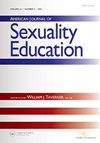跨文化敏感性发展模型对性别世界观发展的解释
IF 1.1
Q2 EDUCATION & EDUCATIONAL RESEARCH
引用次数: 0
摘要
性学世界观是人们观察和理解周围性世界的视角。跨文化敏感性的发展模型(DMIS)可能是一个有用的工具,在操作文化谦卑和性学差异的反应。这项研究探讨了DMIS是否解释了一个人的性学世界观发展的各个阶段,从二元主义到相对主义的观点,以及与相似或不同的人互动的方式。主要作者在美国采访了30名性学专业人士和学生,发现参与者的性学世界观发展可以用DMIS框架来解释。我们讨论了DMIS在性态度再评估(SAR)项目的未来设计中的使用,这是性学家资格认证所需的一种培训,以及SAR培训结果的测量,因为它们与文化谦逊和反应性有关。未来的研究应侧重于开发一种测量性学世界观发展的实证工具,特别行政区教育工作者应创造新的或调整现有的培训活动,以适应其特别行政区参与者的世界观发展。本文章由计算机程序翻译,如有差异,请以英文原文为准。
Sexological Worldview Development Explained by the Developmental Model of Intercultural Sensitivity
Abstract Sexological worldview is the lens through which someone sees and makes meaning of the sexual world around them. The Developmental Model of Intercultural Sensitivity (DMIS) may be a useful tool in operationalizing cultural humility and responsiveness to sexological differences. This research explored whether the DMIS explains the stages of someone’s sexological worldview development across a continuum of dualist to relativist perspectives and ways of interacting with others who are similar or different. The lead author interviewed 30 sexuality professionals and students in the US and found that the participants’ sexological worldview development could be explained using the DMIS framework. We discuss the use of the DMIS for the future design of Sexuality Attitudes Reassessment (SAR) programs, a type of training required in the credentialing of sexologists, and the measurement of SAR training outcomes as they pertain to cultural humility and responsiveness. Future research should focus on the development of an empirical instrument to measure sexological worldview development and SAR educators should create new, or align existing, training activities to match their SAR participants’ worldview development.
求助全文
通过发布文献求助,成功后即可免费获取论文全文。
去求助
来源期刊

American Journal of Sexuality Education
EDUCATION & EDUCATIONAL RESEARCH-
CiteScore
2.40
自引率
8.30%
发文量
39
期刊介绍:
The American Journal of Sexuality Education speaks directly to the distinct, professional needs of sexuality educators and trainers. This peer-reviewed journal provides sexuality educators and trainers with current research about sexuality education programming, best practices, sample lesson plans, reports on curriculum development and assessment, literature reviews, scholarly commentary, educational program reports, media reviews (books, videos, internet resources, and curricula), and letters to the editor. The American Journal of Sexuality Education addresses a variety of sexuality topics and audiences, presenting up-to-date theory and practice, lessons, and evaluations.
 求助内容:
求助内容: 应助结果提醒方式:
应助结果提醒方式:


